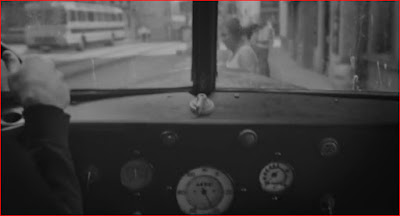From Nice to London to Charlottesville to Barcelona, the wonder is that it took so long for vehicular homicide to become a popular form of terrorism. On the Islamist side, I suppose you needed a generation not enthralled by Osama bin Laden's vision of spectacular attacks on a September 11 scale to come of age. Closer to home, the gun may still be the weapon of choice, but last weekend's atrocity in Virginia hints at the growing appeal of the car attack's lethal simplicity. All these tough guys follow in the footsteps of a 22 year old woman from the once-upon-a-time land of Czechoslovakia. Olga Hepnarova may not have been the first person to deliberately run down pedestrians en masse, but a Wikipedia list of mass vehicular homicides has her 1973 attack close to the beginning. Last year, filmmakers Tomáš Weinreb and Petr Kazda put her story on film, and you can stream it now on Netflix, where it is perhaps too exotic an item for its availability to be found insensitive.
Weinreb and Kazda show events leading up to Hepnarova's rampage in Prague, where she killed eight people and injured many more. Unlike today's auto-killers, Olga (Polish actress Michalina Olszanska) is a rebel pretty much without a cause, though she eventually portrays herself in court (and in a letter to the press mailed before the attack) as an anti-bullying avenger. We see some of this bullying early on, when Olga is beaten up in a shower by a gang of girls who we earlier saw making out two-by-two in their dormitory beds. Olga appears to be lesbian herself -- at one point she requests the Communist government to provider her a girlfriend -- but seems torn between her desire and a fundamental aloofness verging on the misanthropic. She makes little effort to get along with anyone, especially her long-suffering family, unless she's trying to seduce someone. At other times she's so reticent or phobic that she can hardly stand to claim her paycheck at her job because she'd have to say her name and talk to somebody.
Olga attempts suicide early in the picture, but the film leaves open whether she's really crazy until the end, after she's been sentenced to hang for her atrocity, when she develops (or affects) a separate personality who, unlike original Olga, considers herself innocent and doesn't want to die. A story like hers inevitably raises a three-way question: was she crazy, was she just doomed to be a miserable wretch, or does society bear some share of the blame for how she turned out? The filmmakers muddy the waters somewhat by having Olszanska portray Hepnarova as probably hotter than she actually was, in a glowering early Winona Ryder sort of way. The actress does what she can with body language and facial expressions to remind us of Olga's off-putting nature, but the fact that Olszanska is undeniably attractive, and the more questionable decision by the writer-directors to use her looks to titillating effect on occasion, might make you think that Olga could have had a happier life if she had a better attitude -- but I don't know if that's the auteurs' own conclusion. I'm not even sure they ever drew a conclusion. They keep a distance from the subject, both the woman and her crime, filming the actual attack in matter-of-fact fashion, from inside Olga's truck, as people go down like cardboard traffic obstacles. The black and white cinematography contributes to the distancing effect, though it also may be a shout-out to Czech New Wave cinema, which was a thing when Olga was growing up. The odd thing about that is that I was reminded less of Czech movies than of a particular French film. Combine the character's miserable existence, the actress's grim expressions, and the monochrome picture, I had the chilling feeling that Olga Hepnarova was Mouchette all grown up and taking an alternate path I'd imagined for her five years ago. You won't have to have seen Robert Bresson's classic to find I, Olga Hepnarova chilling, especially in our time, when it serves as stark evidence that nearly anyone -- never mind your profiles -- is capable of such a thing.





No comments:
Post a Comment